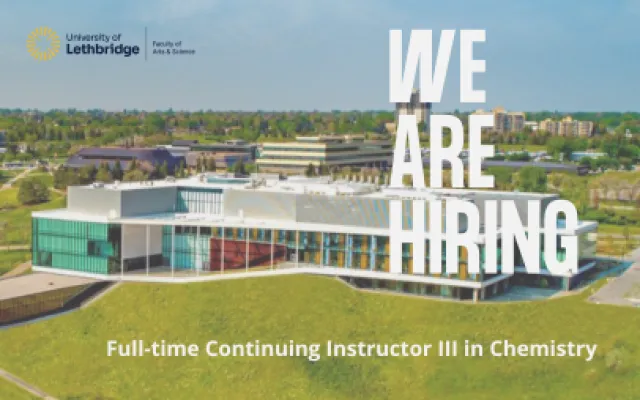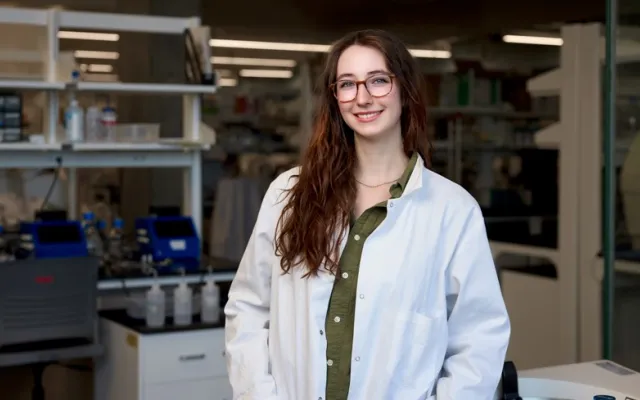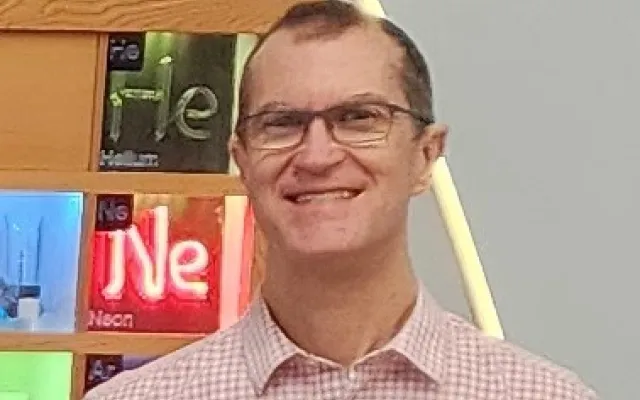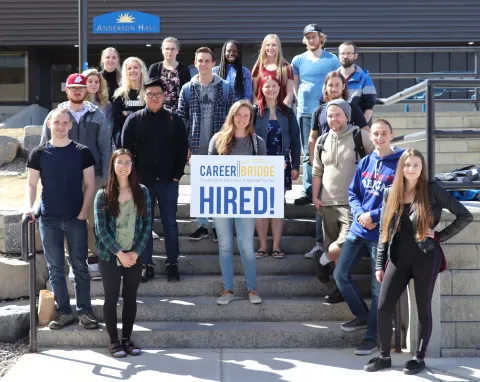Department of Chemistry & Biochemistry
ELEMENTS. CHEMICALS. MINERALS. MOLECULAR. PHYSICAL.
Chemistry is often called the central science as it deals specifically with the 112 elements that comprise all matter. There are five branches of chemistry: analytical chemistry, organic chemistry, inorganic chemistry, physical chemistry and theoretical chemistry. The primary focus of the program is to provide you with extensive theoretical knowledge in all five branches of chemistry while enhancing your technical and practical skills with hands-on experience and research opportunities.
The Departments of Chemistry & Biochemistry and Biological Sciences jointly offer a multi-disciplinary major in biochemistry for the 40-course Bachelor of Science (BSc). You can also select a general major in the sciences and choose biochemistry courses as options. Biochemistry will help you develop a strong background in the basic sciences and extensive laboratory skills. Thereby, it provides background for a diverse range of careers in the life sciences, including professional programs such as medicine and veterinary medicine.
The Department of Chemistry & Biochemistry is home to many advanced instruments which enable cutting-edge research. These tools include nuclear magnetic resonance (NMR), infra-red, Raman, UVvisible, atomic absorption spectrometers, macromolecular x-ray diffractometer, isothermal titration calorimeter, and a surface plasmon resonance spectrometer.
Apply Now!

Full-time Continuing Instructor III in Chemistry
Department Highlights

International Women's Day Leadership Conference
On March 11, ULethbridge will host its third annual International Women’s Day Leadership Conference. This year’s theme is Disrupting the Superwoman Narrative, Embracing the Power of Rest. Keynote speakers for 2026 include Jully Black, R&B artist and Juno Award winner, and Dr. Malinda Smith, Associate Vice-President (Research EDI) at UCalgary. We’ll also have a panel of prominent local leaders who will share their experiences and stories:
Whitney (BMgt '06) and Kirby Maronda – The Property Twins Real Estate
Iitoomsaokaa’sii Diandra Bruised Head (BSc '17), Indigenous Learning and Impact, Manager, Iniskim Indigenous Relations, ULethbridge
Jenn Schmidt-Rempel (BA '93) - Councillor, City of Lethbridge
There’s still time to secure your ticket at the early bird rate, in effect until Jan. 30, which has a 20 per cent price savings! Exclusive sponsorships are also available until Feb. 13. For more info, visit go.uleth.ca/womensconference.

University of Lethbridge undergraduate leads study published in top-tier journal
A groundbreaking study led by University of Lethbridge undergraduate Sophia Bird is advancing vaccine development while highlighting the national importance of the Canadian Center for Hydrodynamics, which offers access to analytical ultracentrifugation (AUC).
The study, High-Resolution Characterization of Protein-Conjugated, mRNA-Loaded Lipid Nanoparticles by Analytical Ultracentrifugation, was recently published in Advanced Functional Materials, a leading journal in the field.
Pharmaceutical companies use the AUC to assess the purity of their vaccine formulations during development. Bird and the research team, working under the supervision of Dr. Borries Demeler, developed a new technique to measure the purity.

2026 Fellows of the CIC Award
CIC Fellowship is a senior class of membership that recognizes the merits of CIC members who have made outstanding contributions across multiple areas:
- Scientific, Engineering and Technical Contributions
- CIC, CSC, CSChE Service
- Management of Science, Engineering or Technology
- Teaching, Mentorship, and Public Awareness
Paul G. Hayes received a B.Sc. (Honours) from Mount Allison University. He completed his Ph.D. at the University of Calgary and undertook an NSERC Postdoctoral Fellowship at the University of California, Berkeley. He has been an active member of the Canadian chemical community for more than 25 years. He served as an Associate Editor for the journal RSC Advances from 2015-2023 and was the Guest Editor for a double issue of the Canadian Journal of Chemistry in honour of the late Stephen Westcott. Paul was the Technical Program Co-Chair of CCCE 2022, the CSC Director of Subject Divisions (2022-2025), and currently sits on the CSC Accreditation Committee. He has a lengthy record of innovative teaching, promoting access to education and establishing international student exchanges. He has given numerous talks to government officials and the public, and works to support existing, and establish new opportunities for school-aged students to learn about, and participate in, the chemical sciences. Paul has received international accolades for his research program in organometallic chemistry and catalysis, including a Long-term Invitational Fellowship from the Japan Society for the Promotion of Science in 2021, and has been a Visiting Professor at RWTH Aachen, Nagoya and Hokkaido Universities. He is currently Professor and Chair of the Department of Chemistry and Biochemistry at the University of Lethbridge, where he has been a Tier I Board of Governors Research Chair in Organometallic Chemistry.
Shining Student Uvindu Abeysekara: A journey of academic excellence, research, and community engagement at ULethbridge
From iGEM to innovating antibiotics: Sydnee Calhoun's inspiring journey at ULethbridge
Shining Student Ty Dudas
Career Bridge: Centre for Work-Integrated Learning and Career Development

Put Your Knowledge to Work
Whether you’re looking for a more in-depth learning experience by assisting with research projects on campus or by testing your knowledge in a real-life work setting, we can help! The University of Lethbridge is proud to offer you an exceptional opportunity to explore professional development through academic programs and services designed to give you a competitive edge in a fast-changing world.
You have a bright future — experience it via Career Bridge at uLethbridge!
